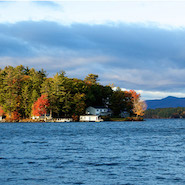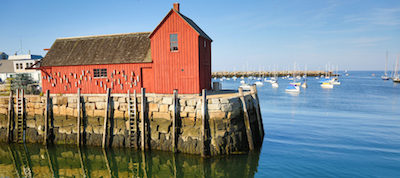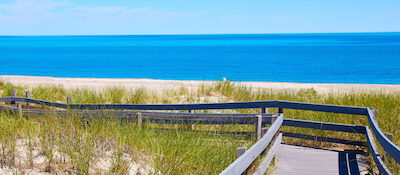 Lake Winnipesaukee
Lake Winnipesaukee
First-time and move-up buyers are impacting New England’s luxury coastal market, according to a report from Re/Max Integra.
The second quarter of 2016 saw the coastal New England housing market grow significantly, showing that waterfront views, beaches and mild weather never go out of style. That omnipresent allure, along with an increase in job opportunities and investors and decrease in interest rates, are fueling the market.
"The luxury, coastal home market shows significant promise as we continue into the summer months,” said Dan Breault, executive vice president and regional director at Re/Max Integra, New England. “A general rise in the volume of homes sold combined with a decrease in the average number of days on market over the past year signifies an increase in market demand.”
The 2016 New England Luxury Coastal Report covers the markets of Cape Cod, South Shore and North Shore, MA; Coastal Maine; Coastal and Lake Winnipesaukee, NH. Individual cities within each market as well as the region as a whole are included.
Timeless luxury
More than two-thirds of the communities covered in the report saw an increase in the number of single-family homes sold during the second quarter of 2016 compared to the same timeframe in 2015. More than half also saw an increase in median price and days on market decreased, showing that demand is as high as ever.
 Portland Head Lighthouse in Cape Elizabeth, Maine
Nearly all Coastal Maine towns have seen median prices increase. In Portland, the year-over-year days on market has shrunk from more than 140 to just 28 thanks to its hiking and fishing access and popularity among both domestic and international buyers.
In Cape Cod, MA investors and home flippers are driving prices and demand up. In the past calendar year, the median price for a luxury single-family home has increased nearly 50 percent, from $1.25 million to $1.85 million.
In both South Shore and North Shore, improved transportation infrastructure has led to more jobs, and subsequently higher real estate demand, particularly among first-time and move-up buyers.
Portland Head Lighthouse in Cape Elizabeth, Maine
Nearly all Coastal Maine towns have seen median prices increase. In Portland, the year-over-year days on market has shrunk from more than 140 to just 28 thanks to its hiking and fishing access and popularity among both domestic and international buyers.
In Cape Cod, MA investors and home flippers are driving prices and demand up. In the past calendar year, the median price for a luxury single-family home has increased nearly 50 percent, from $1.25 million to $1.85 million.
In both South Shore and North Shore, improved transportation infrastructure has led to more jobs, and subsequently higher real estate demand, particularly among first-time and move-up buyers.
 Lobster shack and landmark of Rockport, MA
New Hampshire is conveniently located between Portland, ME and Boston, making it popular for second-home buyers. In Portsmouth, NH, median day on market is now 73, compared to 213 days last year.
Commercial investments are taking hold near Lake Winnipesaukee, propelling median home prices up by nearly 50 percent in the cities of Gilford and Laconia, NH. Proximity to Boston, Portland and Burlington, VT will help keep the market strong in the future.
While coastal markets have seen increases, Boston proper has largely seen the opposite results for single-family homes. All markets have seen sales fall, and only the Charlestown neighborhood had an increase in prices.
Lobster shack and landmark of Rockport, MA
New Hampshire is conveniently located between Portland, ME and Boston, making it popular for second-home buyers. In Portsmouth, NH, median day on market is now 73, compared to 213 days last year.
Commercial investments are taking hold near Lake Winnipesaukee, propelling median home prices up by nearly 50 percent in the cities of Gilford and Laconia, NH. Proximity to Boston, Portland and Burlington, VT will help keep the market strong in the future.
While coastal markets have seen increases, Boston proper has largely seen the opposite results for single-family homes. All markets have seen sales fall, and only the Charlestown neighborhood had an increase in prices.
 Cape Cod Sandy Neck Beach in Barnstable, MA
Days on market also increased for most neighborhoods, and falls in South End and South Boston were nevertheless met with significant price decreases of 14.9 and 5.7 percent, respectively.
Condos fared better, with big price and sale increases in the West End, South End and Back Bay.
Face in the crowd
While the appeal of oceanfront properties and blue skies keep the coastal market robust, United States housing markets, from Boston to Los Angeles, are stalling due to issues ranging from a stronger dollar and stock market volatility to broader geopolitical issues.
The luxury housing market is in a slump, with prices falling 1.1 percent in the first quarter of 2016 compared to the year-ago period, according to a new report from Redfin.
Aside from a positive blip in 2015’s fourth quarter, the market has been slowing since the third quarter of 2014, so the drop is not terribly surprising. With prices falling, buyers are taking advantage, and several cities are proving themselves as viable luxury hubs for the future (see story).
Slowing markets around the U.S. are due partly to a deceleration of foreign buyers owing to the strong dollar. By contrast, the much weaker Canadian dollar has led to heavy foreign investment in the country.
Real estate advisors believe that foreign buyers purchase at least a quarter of Canadian luxury properties, according to a new report from Royal LePage.
When asked about changes in the market, two-thirds of advisors say foreign buyer activity has increased, with 24 percent saying foreign buyers account for at least 25 percent of properties. Canada’s culture, laws and currency suggest that the trend will continue throughout the year (see story).
The positive outlook along New England’s coasts despite the movement of capital speaks to the timeless appeal of priceless experience.
Cape Cod Sandy Neck Beach in Barnstable, MA
Days on market also increased for most neighborhoods, and falls in South End and South Boston were nevertheless met with significant price decreases of 14.9 and 5.7 percent, respectively.
Condos fared better, with big price and sale increases in the West End, South End and Back Bay.
Face in the crowd
While the appeal of oceanfront properties and blue skies keep the coastal market robust, United States housing markets, from Boston to Los Angeles, are stalling due to issues ranging from a stronger dollar and stock market volatility to broader geopolitical issues.
The luxury housing market is in a slump, with prices falling 1.1 percent in the first quarter of 2016 compared to the year-ago period, according to a new report from Redfin.
Aside from a positive blip in 2015’s fourth quarter, the market has been slowing since the third quarter of 2014, so the drop is not terribly surprising. With prices falling, buyers are taking advantage, and several cities are proving themselves as viable luxury hubs for the future (see story).
Slowing markets around the U.S. are due partly to a deceleration of foreign buyers owing to the strong dollar. By contrast, the much weaker Canadian dollar has led to heavy foreign investment in the country.
Real estate advisors believe that foreign buyers purchase at least a quarter of Canadian luxury properties, according to a new report from Royal LePage.
When asked about changes in the market, two-thirds of advisors say foreign buyer activity has increased, with 24 percent saying foreign buyers account for at least 25 percent of properties. Canada’s culture, laws and currency suggest that the trend will continue throughout the year (see story).
The positive outlook along New England’s coasts despite the movement of capital speaks to the timeless appeal of priceless experience.
